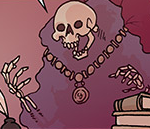|
Plutonis posted:Yeah I think I was too harsh on my assessment of him and I honestly respect the fact that he reportedly refused to sell the site when it was worth the money to chinese billionaire companies thirsty for metadata and whatever state secrets Vilerat's account might have had and kept it real with the forums but he has mishandled the internet profits he got from it worse than anyone I know other than DSP. Ultimately I'm just saying that it's not a clear-cut situation between good and bad, there's lousy issues all over however this shakes out, and people can make their own judgments based on that.
|
|
|
|

|
| # ? Jun 11, 2024 11:24 |
|
Meyers-Briggs Testicle posted:how can I make equipment matter in a grounded, realistic, historical RPG? if you're talking mass combat, then equipment matter as far as logistics matters. if you're talking man-to-man combat, there's definitely some kind of dynamic at play where you're far more likely to win if your armor is thick/tough/encasing enough that the enemy's weapons cannot penetrate, or if you have a better reach on your opponent, etc., but I don't think two people wielding the same equipment set-up will have a quantifiable advantage from one longsword to another unless you start delving into magic. There's probably some room to play around with crafting and manufacturing techniques playing into the durability of an item, but then that's where the "masterwork" abstraction comes into play: the character gets a +1 to hit or whatever because the alternative is having them keep track of metal fatigue and that's a much more niche mechanic to try to explore.
|
|
|
|
bewilderment posted:As a kid in school (i.e., roughly aged 14) we had an entertaining time where we were given wooden swords and told to try to land some hits on a guy in full armour who was trained, but if he landed a touch on you then you were basically dead. yeah the way armored knights usually died in combat (if they did) was getting swarmed and dragged down, then stabbed in a weakpoint like the armpit or other joint, or drowned in the muck and mud. Besides the usual sort of "well you got a wound, better drain your blood to balance the humours! *wipes off poop knife and gets to stabbin'*" Coolness Averted fucked around with this message at 18:03 on Mar 15, 2019 |
|
|
|
Was mostly thinking The Once and Future King, which has a whole rant about how a knight in armour is basically invincible and the 'gentlemanly' ways of war meaning he's more likely to be captured and ransomed than killed, which ultimately turns war into a sport or a LARP with real weapons. (Venture Bros does come to mind; it's poor sport to kill your nemesis, but henchmen and bystanders are just part of the game) Even crossbows and guns could be met with bigger and heavier armour if you had the money, apparently what really killed the armoured knight was pike formations, and probably the re-establishment of organised armies in general.
|
|
|
|
Sword quality affects sword maintenance. If you don't treat your sword well it quickly becomes a club. A sword made of better metal will keep an edge better.
|
|
|
|
I do wonder about that given I'm probably about to start a King Arthur Pendragon campaign. With a Saxon PC who'll be swinging a Great Sword all over the goddamn place. Though I assume an knight's maintenance money will take care of that. Pendragon does lend itself towards that view given Armour is flat out reduction of damage that's measured in d6 rolls.
|
|
|
|
Nobles have always, always loved killing hordes of peasants as part their elaborate, essentially risk-free peacock fights with other nobles. Why do you think the iconic weapon is the sword? Swords are only reliable against foes that you've somehow caught unarmored, unarmed, or otherwise at a structural disadvantage. It's the perfect weapon for people who's entire success in life depended on being born more powerful than anyone else.
|
|
|
|
Haystack posted:Nobles have always, always loved killing hordes of peasants as part their elaborate, essentially risk-free peacock fights with other nobles. Why do you think the iconic weapon is the sword? Swords are only reliable against foes that you've somehow caught unarmored, unarmed, or otherwise at a structural disadvantage. It's the perfect weapon for people who's entire success in life depended on being born more powerful than anyone else. It is pretty funny how swords are considered the peak of deadliness, the generalist weapon for most RPGs, and whatnot when in reality it seems like weaponized hammers/picks are much better actual generalists. But those are peasant tools so they're relegated to supporting characters or bad guys in most media.
|
|
|
|
Darwinism posted:It is pretty funny how swords are considered the peak of deadliness, the generalist weapon for most RPGs, and whatnot when in reality it seems like weaponized hammers/picks are much better actual generalists. But those are peasant tools so they're relegated to supporting characters or bad guys in most media. ?? Its the spear lol Unless you are in close combat a spear wins almost 100%. If you have three guys with spears its actually 100% vs anything else besides other kinds of spears.
|
|
|
|
Haystack posted:Nobles have always, always loved killing hordes of peasants as part their elaborate, essentially risk-free peacock fights with other nobles. Why do you think the iconic weapon is the sword? Swords are only reliable against foes that you've somehow caught unarmored, unarmed, or otherwise at a structural disadvantage. It's the perfect weapon for people who's entire success in life depended on being born more powerful than anyone else. Are you funnin' me, or is this a serious post?
|
|
|
|
Halberds/Hammers ftw
|
|
|
|
Meyers-Briggs Testicle posted:?? Its the spear lol Spears are cool but eh, the Greek spear wielding "invincible" Phalanxes did managed to lose against the Roman sword wielding Legions but there could be several factors for that (Roman shields being way better for dealing with Greek/Macedonian pikes and the Romans frequently updating their tactics while the Hellenics usually used the same tactics as Philip II).
|
|
|
|
Meyers-Briggs Testicle posted:?? Its the spear lol
|
|
|
|
Swords are cop weapons don't @ me
|
|
|
|
grassy gnoll posted:Are you funnin' me, or is this a serious post? The iconic longsword was never a terribly effective battlefield weapon. Even wealthy fighters prefered some sort of spear/polearm or mace/hammer/pick. Swords required a lot more skill to make, were harder to maintain, and were typically less effective at dealing with most sorts of armor. Chopping swords, similar to machetes, saw plenty of use though.
|
|
|
|
Plutonis posted:Spears are cool but eh, the Greek spear wielding "invincible" Phalanxes did managed to lose against the Roman sword wielding Legions but there could be several factors for that (Roman shields being way better for dealing with Greek/Macedonian pikes and the Romans frequently updating their tactics while the Hellenics usually used the same tactics as Philip II). I was talking about solely 1v1 or small group skirmishes. Yeah on a mass scale with arrows and horses and actual tactics a spear isnt iddqd god mode but any pole arm is going to be better than a hammer or sword, and I bet Romans used spears too (I dont know anything about rome)
|
|
|
|
When it boils down to it, swords really are just oversized knives, in both form and function. Sure, you can fight with them, but they're best suited for slaughtering weaker targets that you already have the drop on. Against actual opposition you want a bunch of buddies and a pole-arm. Thing is, the a huge part of actual warfare is always one-sided raiding, slaughter, and oppression, and in that sort of conflict, the sword comes into its own. Swords are what come out when you've already won by other means, and that's why they're the weapon of nobility.
|
|
|
|
??? Every weapon performs that function. Also, lol at 'this weapon is inherently better' - every medieval or antique weapon that was used in a widespread fashion had a purpose suited to the tactics and context of its time and place. The Roman gladius was adopted from, iirc, Spain, because before that they used spears. Tactically it was used at close range once the spear formations had run up against each other, and it allowed Roman legions to start off in the style of a phalanx but convert to close-range stabbing. Unlike the Greek or Macedonian phalanx, which would just roll into the enemy and keep doing that until one side broke. Regardless, the actual 'noble' quality of the sword is versatility and expense (it's all metal and requires significant skilled labor to produce) rather than slaughtering peasants, you can slaughter peasants with any weapon. Swords can parry, and nobility in warfare generally wanted to be as hard to kill as possible. Defending with a spear or axe, or any polearm with a heavy head, means you have to rotate the entire thing out of the killing line. They're more expensive to produce and less useful in massed units or in killing individual soldiers with polearms. Also this ignores that the cavalry saber and its many variants are effectively just long axes for swinging as you ride, and cutlasses are meant to also cut ropes on board a ship - 'sword' is such a wide variety of weapons that making claims about them generally (other than, I would argue, versatility and expense) is just... why do that? E: also, the longsword was basically just used like a spear with sharp edges all along the length, that you could also wield as a parrying tool. Medieval armored fighting manuals involve a ton of using a gauntleted hand to hold the blade partway down for a spear grip (iirc it's called 'halfhanding') and bashing with the hilt. It's true that the expense of producing a sword made it a status symbol in most societies with a warrior nobility, and it's true that warrior nobility suck incredible rear end, but swords themselves aren't actually useless. EE: Plutonis makes a good point that tactical innovation and flexibility matters far more in the history of warfare than the Fire Emblem Weapon Triangle. Shaka transformed Zulu warfare by making the long throwing-and-poking spears of his era into the assegai, a shorter, wider-bladed sword-spear, while emphasizing closing ground and stabbing your opponent at zero range. He crushed all opposition in the field and redefined South African geopolitics, because it was an effective counter tactic to his era. Joe Slowboat fucked around with this message at 17:35 on Mar 15, 2019 |
|
|
|
Meyers-Briggs Testicle posted:I was talking about solely 1v1 or small group skirmishes. Yeah on a mass scale with arrows and horses and actual tactics a spear isnt iddqd god mode but any pole arm is going to be better than a hammer or sword, and I bet Romans used spears too (I dont know anything about rome) The Romans absolutely used spears, mostly with the idea that they'd be throwing them en masse before getting it for close work with sword and shield.
|
|
|
|
unseenlibrarian posted:The Romans absolutely used spears, mostly with the idea that they'd be throwing them en masse before getting it for close work with sword and shield. And their famous shield and spear formations! The Roman turtle surely struck fear into the hearts of their enemies, despite looking frankly hilarious.
|
|
|
|
Basically, the Romans realized that the shield wall that was the really effective part of ancient warfare, so they tailored their kit around that. They disrupted the enemy shield wall with pilium, and when the enemy line was broken it didn't matter how long your stabby bit was. You just had to stay in formation and keep breaking their line. My understanding is that they settled on the gladius because it was strong, lightweight, and versatile. In that light, roman tactics weren't that different from other phalanx warfare, just very optimized.
|
|
|
|
Haystack posted:Basically, the Romans realized that the shield wall that was the really effective part of ancient warfare, so they tailored their kit around that. They disrupted the enemy shield wall with pilium, and when the enemy line was broken it didn't matter how long your stabby bit was. You just had to stay in formation and keep breaking their line. My understanding is that they settled on the gladius because it was strong, lightweight, and versatile. In that light, roman tactics weren't that different from other phalanx warfare, just very optimized. ...this directly contradicts your position from earlier, though? Unless you're arguing that once the line was disrupted, phalanx soldiers were basically unarmed and helpless, having somehow dropped their spears?
|
|
|
|
Historically, swords were pretty much always sidearms people switched to once they were too close for spears.
|
|
|
|
A sword or long knife is something you carried because you were a peasant or burgher and couldn't afford a real weapon. They weren't used in pillaging or when you've unseated yon chivalric knight, they were used to stab back at the guy trying to roll you for your purse when you passed out in the gutter. An Alexandrian phalanx, a Roman maniple, and a pike block are really not the same thing at all unless your criteria for organization and war-making are "stand around in an approximate square." Peasant levies were not really a thing in most pre-modern and early modern wars because A) they were terrible at fighting, and B) you needed them to stay home and produce your tax base. If you wanted to really go in for this weird incorrect weapon-as-class thing, you should have picked a lance or a cavalry saber or something else intended for use by the equestrian orders.
|
|
|
|
It really depends on the time and place which weapons are considered status symbols, but I feel fairly justified in saying swords of decent quality were pretty expensive in most eras and locations. A dagger, dirk etc would do just as well for fighting the way you describe and required less resources and skill to produce. Also, my impression was that in the specific European Medieval context, university students and urban burghers might have daggers, but rural peasants rarely would have actual steel weaponry? But I could easily be mistaken.
|
|
|
|
Associating weaponry with class also in some cases is explainable as being something deliberate rather than because of economy like for example the possession of swords in Japan was associated with the Samurai upper class only after edicts by Hideyoshi Toyotomi and the Tokugawa shoguns confiscated them away from peasants and monks.
|
|
|
|
Yeah one of the games I'm currently playing has a list of weapons split into lower and upper class, with a note that if you go around with an upper class weapon while not otherwise looking upper class it will attract negative attention. This is specifically because warrior nobility is a big Thing in setting.
|
|
|
|
grassy gnoll posted:A sword or long knife is something you carried because you were a peasant or burgher and couldn't afford a real weapon. They weren't used in pillaging or when you've unseated yon chivalric knight, they were used to stab back at the guy trying to roll you for your purse when you passed out in the gutter. So that's why rapiers and arming swords exist! And I mean sarcasm aside you really just mean 'long knife of some name' there instead of sword
|
|
|
|
fool_of_sound posted:Yeah one of the games I'm currently playing has a list of weapons split into lower and upper class, with a note that if you go around with an upper class weapon while not otherwise looking upper class it will attract negative attention. This is specifically because warrior nobility is a big Thing in setting. L5R?
|
|
|
|
MonsieurChoc posted:L5R? No, a heartbreaker for furries called Ironclaw. We switched to Strike two combats in and kept the setting.
|
|
|
|
fool_of_sound posted:No, a heartbreaker for furries called Ironclaw. We switched to Strike two combats in and kept the setting. This is...this is the opposite of what usually happens with Ironclaw.
|
|
|
|
Zurui posted:This is...this is the opposite of what usually happens with Ironclaw. The setting is whatever, but the GM likes it. The mechanics appear ok to interesting at a glance but are actually distinctly awful, and the book is atrociously laid out.
|
|
|
|
fool_of_sound posted:No, a heartbreaker for furries called Ironclaw. We switched to Strike two combats in and kept the setting. 
|
|
|
|
That was my reaction when it was suggested but it's basically entirely chaste, weirdly enough. The art and everything is more 'Disney's Robin Hood, the RPG'
|
|
|
|
I have only heard good things about Ironclaw and the SFF equivalent, Albedo, weirdly enough. Like, not 'these are the best games ever' but 'these are perfectly cromulent games, they are also about humanoid animals' I've considered running Ironclaw purely because I really want to run Usagi Yojimbo, the RPG. The alternative is L5R but with animal people.
|
|
|
|
Joe Slowboat posted:I have only heard good things about Ironclaw and the SFF equivalent, Albedo, weirdly enough. Yeah, like I said, when I was just reading over the rules and making my character it seemed interesting in places and competent, if badly laid out. In actual play it turned out to be extremely feat tax heavy and swingy, and getting anything done was an absolute crapshoot. Combat was also incredibly needlessly slow since every attack requires multiple reactions from the attacked person.
|
|
|
|
Peasants in the middle ages had steel implements, they were essential for farming which is what 99% of peasants did before the industrial revolution. Peasant weapons are often modified farm equipment. lovely low-carbon steel can be forged into a weapon but it'll bend easily or break easily or hold an inconsistent edge or otherwise suck. A long sword is much much more difficult to make than a short sword not because it uses more steel, but because you need better steel to keep it from taking a bend or developing stress fractures or even just surviving heat treatment. Any blacksmith capable of drawing out steel (which is all of them starting from the iron age anywhere) can make a sword-shaped piece of metal, but only those with access to high quality carbon steel can make a steel sword that will hold up. Swords are also pretty much useless as agricultural implements or for hunting, whereas a spear or a pruning hook or a sickle is a tool. Arming your peasants with swords is wasteful because they can't use it for anything else much. Most likely they'll just take the sword to their local metalworker and reforge it into something that will help them produce more food. Despite all of the above we know that warriors often had to straighten blades mid-battle and many swords and other weapons failed in battles. One of the advantages the romans had over the people they were fighting on their periphery (as opposed to other well-organized nations like the carthaginians) was simply that their equipment was mass produced with more consistent quality standards. On top of superior training, nutrition, and leadership, equipment superiority did matter, particularly in that it permitted an army to engage in months- or years-long campaigns. Of course another thing that supported that was efficient long-distance communications. Getting back to the point, having better swords = more damage or higher likelihood to hit doesn't sit well with me. But if you're not tracking item durability I'm not sure what other sort of statistic you could assign that would make sense.
|
|
|
|
Leperflesh posted:Peasants in the middle ages had steel implements, they were essential for farming which is what 99% of peasants did before the industrial revolution. Peasant weapons are often modified farm equipment. This is a good post and useful, thank you. That being said, it sounds like you either have fantasy standards of what a 'good weapon' is that do increase the effects, like D&D, or you go with 'better weapons past a certain point matters on the mass scale only' and just track that for warfare, not individual players. Or just have weapons break on a particular kind of lovely roll, and the weapon break possibility goes lower the better your weapon is (and stops entirely with magical or artifact weapons in some settings).
|
|
|
|
I honestly detest item durability mechanics on both Vidya and TRPGs myself.
|
|
|
|

|
| # ? Jun 11, 2024 11:24 |
|
Yeah taking the player's weapons away randomly mid-fight may be more "realistic" but it's not fun. If you ruthlessly enforce a medieval simulation on your players, they will experience the ruthlessly awful conditions of medieval life, and that is probably not the game they are hoping to play. e. I mean like if your players are on campaign in the army, they should have like a 2% chance every month of dying of dissentery or infection or something, but you probably don't want to do that either. That chance goes up to like 10% a month if they take an injury of any kind. Leperflesh fucked around with this message at 21:27 on Mar 15, 2019 |
|
|





















